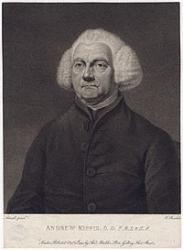1708 - 1776 Person Name: Scott Hymnal Number: a16 Author of "Great God, thy penetrating eye" in Baptist Hymn Book Scott, Elizabeth, daughter of the Rev. Thomas Scott, Independent Minister at Norwich, and sister of Thomas Scott, noted below, was born at Norwich about 1708. In 1751 she was married to Elisha Williams, who had been from 1726 to 1739 Rector of Yale College, U.S.A., and with him she proceeded to Connecticut. On the death of Mr. Williams she was married to the Hon. William Smith, of New York, who also predeceased her. She died at Wethersfield, Connecticut, June 13th, 1776. In connection with Miss Scott's hymns we are acquainted directly and indirectly with four manuscripts, each of which is interesting in itself. These are as follows:—
i. The first manuscript is in the library of Yale College, New Haven, Connecticut. Mr. Franklin Bowditch Dexter, M.A., Assistant Librarian, has tabulated the hymns in this ms. for this Dictionary. He says (Jan. 29, 1889): "The label on the back of this volume is 'Hymns & Poems by Eliz. Scott.' There is no title to the ms. pages. Prefixed to the Hymns and Poems there is, however, a long and very tenderly written dedication (in prose) 'To my much Rever'd, much Lov'd, Father,' this signed ‘E. S.' and dated 1740. Then follows (without numbers) the Hymns with titles and first lines as below." Mr. Dexter adds on the first lines and the titles of 90 hymns.
ii. The second manuscript is in our possession. It is headed "Poems on Several Occasion's by Miss Scott of Norwich, who married to Mr. Williams of New England, January 1750/1." Then follow 26 hymns in full. At the end this is written, "These transcribed from Mrs. Williams' Manuscript, Feb. 27, 1751, the week before she left Norwich to go to New England." The whole of these 26 hymns are in the Yale College manuscript.
iii. The third manuscript we have consulted contains 8 hymns which are prefaced with these words, "Copied from a book of Mrs. Bury's, written by her Aunt Miss Elizabeth Scott, afterwards Mrs. Williamson."
iv. In Dr. Dodd's Christian's Magazine for Dec. 1763 we find a writer who signs himself "CL—T." He had at that time a ms. of Miss Scott's hymns with a Dedication to her father prefixed thereto and signed "Eliz Scott." From this ms. he sent "Why droops my soul with guilt oppressed" (Christ, the Great Physician) to the Dec. number of the magazine; "Evil and few our mortal days" (Vanity of human Life), to the Feb. number, 1764, and "What finite power with ceaseless toil" (Praise for Temporal Blessings), to the April number of the same year.
From these facts it is clear that before departing for America Miss Scott allowed copies of her hymns to be made from her manuscript, and it was mainly from these copies that those of her hymns composed before her marriage were printed in the English hymnbooks. None of those hymns date later than 1750. The collections in which they appeared, and through which they came into common use were the Bristol Baptist Collection of Ash and Evans, 1769, and the New Selection, &c, by J. Dobell, 1806. In Ash and Evans there are 19 hymns, signed "S.," all of which are in the Yale College manyuscruot under the same first lines except "Was it for man, apostate man ?" but this also may possibly be there under another first line. In Dobell there are 20 hymns signed " Scott” of which 17 are in the Yale College ms., 2 are parts of hymns from Ash and Evans, also in that manuscript, and "Sole Sovereign of the earth and skies," also probably in the ms. under another first line. Of the 90 hymns in the Yale ms., in addition there are also in common use:—
i. From Ash and Evans's Collection of Hymns, 1769.
1. God of my life, to Thee belongs. On Recovery from Sickness.
2. My God, shall I for ever mourn? Covenant-keeping God. From this "Shall e'er the shadow of a change?" is taken (st. iii.).
3. When Abram full of sacred awe. For a Fast Day. Sometimes, “Thus Abram, full of sacred awe."
4. Why, O my heart, these anxious cares? Submis-sion.
ii. From J. Dobell's New Selection, &c, 1806.
5. Dare we indulge to wrath and strife? Against Wrath.
6. Eternal Spirit, 'twas Thy breath. Whitsuntide.
7. For ever shall my fainting soul. Against grieving the Holy Spirit. Sometimes "0 Lord, and shall our fainting souls?"
8. Great God, Thy penetrating eye. God All and in All.
9. The glitt'ring spangles of the sky. The Mercies of God.
10. Thy bounties, gracious Lord. Offertory.
11. Where'er the Lord shall build my house. Family Religion.
--Excerpts from John Julian, Dictionary of Hymnology (1907)
================
Scott, Elizabeth, p. 1019, ii. Another of her hymns in common use from the Collection of Ash & Evans, 1769, No. 393, “The Lord of love will sure indulge," is given in some American hymnals as "The God of mercy will indulge" (Death of Parents), with the name of "Fawcett" prefixed in error.
--John Julian, Dictionary of Hymnology, Appendix, Part II (1907)
Elizabeth Scott


 My Starred Hymns
My Starred Hymns


